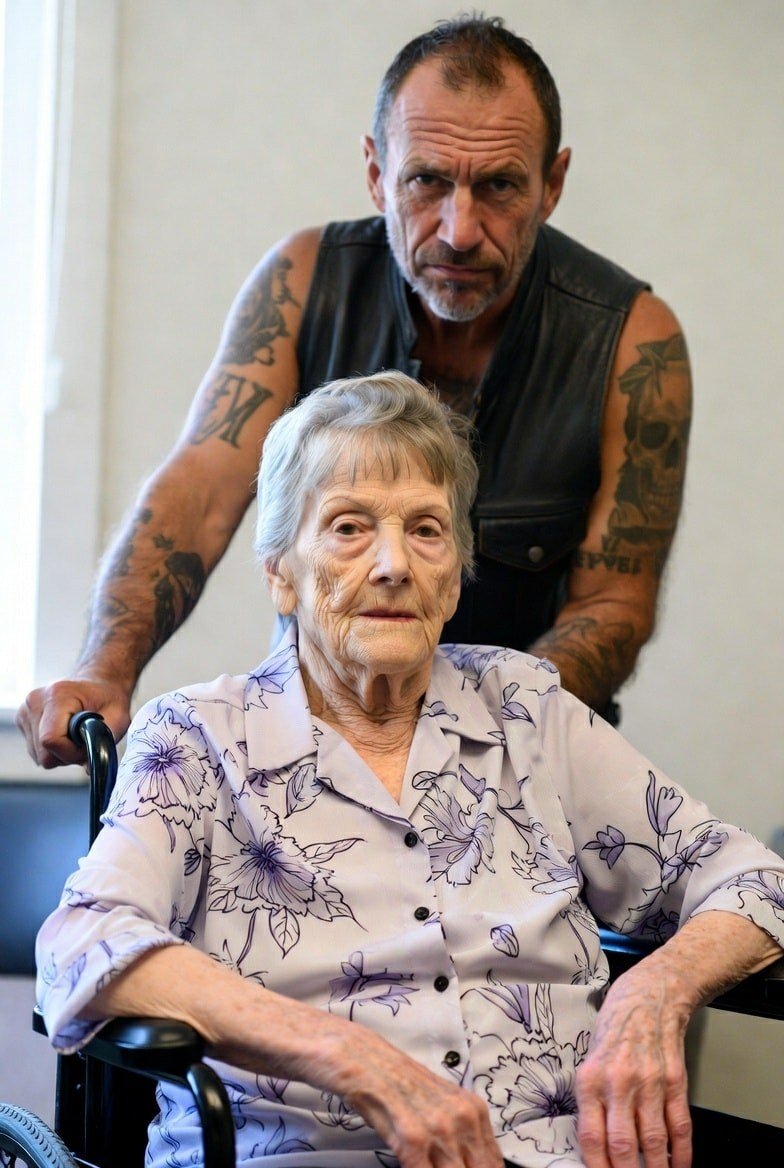Dorothy Mitchell had lived alone in apartment 4B for over four decades, her days reduced to quiet routines and the dull hum of loneliness.
At eighty-seven, with Parkinson’s disease and a brittle frame that seemed to bend beneath the weight of time, her world had shrunk to four walls and a rotating list of caregivers who treated her like a task. I lived across the hall, a journalist working from home, and from my window I saw it all — the nurses who came and went, the unopened mail, the way Dorothy sometimes left her door cracked just to hear footsteps in the hallway.
Then, one icy Tuesday in January, everything changed. A tattooed biker, broad as a doorframe and wearing a leather vest, walked into her apartment carrying grocery bags. I thought she was being robbed — until I heard her laugh.
“This is Michael,” she said proudly, her voice bright with mischief. “He’s my new helper. I fired the agency.” The man, who looked more like a rock concert bouncer than a caregiver, smiled as he unpacked her groceries, placing everything exactly where it belonged.
When he gently handed her medication and water, I realized this wasn’t some reckless decision. This was trust. Later, Dorothy told me how they’d met — in a grocery aisle, when she thought he was stealing her purse.
She had whacked him with her cane before realizing he was just trying to help her reach a bottle on the top shelf. What began as an awkward apology over coffee became a friendship between two lonely souls — one elderly woman seeking kindness, and one man quietly searching for redemption.
Two weeks later, her children stormed in like a boardroom intervention — luxury cars in the parking lot, legal threats in hand. They called her “incompetent,” shouted about power of attorney, and accused Michael of manipulation. From my doorway, I watched Dorothy tremble in her chair while her kids stood over her, shouting as though love could be measured in control. And then Michael spoke.
He didn’t defend himself with anger — only truth. He pulled out an old photograph of his late mother, explaining how he’d been “on the road” when she died alone in a state home. “This isn’t a job,” he said, his voice trembling.
“It’s a penance. I’m doing for your mother what I couldn’t do for mine.” In that moment, the room changed. The rage softened. Even Dorothy’s sharp-tongued daughter began to cry. Dorothy reached out her frail hand, whispering through tears, “He’s not a criminal. He’s a promise-keeper.”
That evening, the shouting stopped. From across the hall, I heard something I hadn’t in months — laughter. When I peeked through the crack of my door, the scene inside 4B was something miraculous. Dorothy’s children sat around her tiny table, listening to her stories instead of their phones.
Michael poured tea and smiled from the kitchen. The walls, once heavy with silence, now glowed with warmth and voices. The biker who looked like trouble had done what years of expensive care and distant love could not — he’d given her back her life.
He hadn’t just rescued her from loneliness; he’d reminded her family what love really looked like. And as the night deepened and their laughter spilled softly into the hallway, I finally closed my door — because for the first time in years, Dorothy wasn’t alone.


